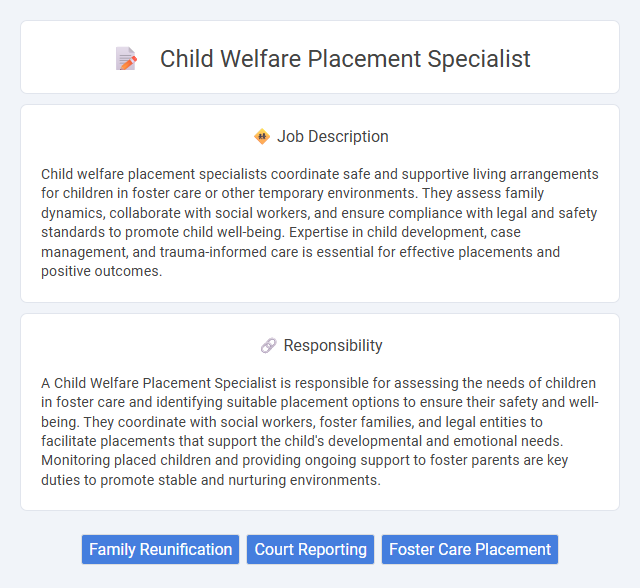
Child welfare placement specialists coordinate safe and supportive living arrangements for children in foster care or other temporary environments. They assess family dynamics, collaborate with social workers, and ensure compliance with legal and safety standards to promote child well-being. Expertise in child development, case management, and trauma-informed care is essential for effective placements and positive outcomes.
Individuals with strong empathy, excellent communication skills, and the ability to handle emotionally challenging situations will likely be suitable for a Child Welfare Placement Specialist role. Those who can remain calm under pressure and demonstrate a high level of patience may have a higher probability of success in managing the needs of at-risk children and coordinating appropriate placements. Candidates lacking emotional resilience or effective interpersonal skills might face difficulties meeting the demands of this position.
Qualification
A Child Welfare Placement Specialist typically requires a bachelor's degree in social work, psychology, or a related human services field, with many positions preferring a master's degree in social work (MSW). Essential qualifications include experience in child protective services, knowledge of child welfare policies, and strong skills in case management, family assessment, and crisis intervention. Certifications such as Licensed Clinical Social Worker (LCSW) or Child Welfare Certification can enhance job prospects and demonstrate professional competency.
Responsibility
A Child Welfare Placement Specialist is responsible for assessing the needs of children in foster care and identifying suitable placement options to ensure their safety and well-being. They coordinate with social workers, foster families, and legal entities to facilitate placements that support the child's developmental and emotional needs. Monitoring placed children and providing ongoing support to foster parents are key duties to promote stable and nurturing environments.
Benefit
A Child Welfare Placement Specialist likely improves outcomes for children by ensuring they are placed in safe, supportive environments tailored to their needs. This role may enhance family reunification chances and reduce foster care disruptions. Employers probably benefit from reduced long-term costs due to more stable placements and improved child well-being.
Challenge
Working as a Child Welfare Placement Specialist likely involves navigating complex family dynamics and ensuring the safety and well-being of vulnerable children, which can present significant emotional and logistical challenges. The role probably demands balancing court mandates, resource limitations, and urgent needs for suitable foster or permanent placements. It is reasonable to expect that managing caseloads with unpredictable crises will require strong problem-solving skills and resilience.
Career Advancement
Child welfare placement specialists play a critical role in coordinating safe, supportive environments for children by assessing family situations and managing foster care placements. Career advancement in this field often includes progressing to supervisory roles, such as case management supervisors or program directors, where oversight of multiple cases and staff increases. Enhancing qualifications through advanced degrees in social work or certifications in child welfare can lead to higher-level positions and specialized roles focused on policy development or child advocacy.
Key Terms
Family Reunification
Child welfare placement specialists play a critical role in facilitating family reunification by assessing and developing safe, supportive environments for children returning to their biological families. They coordinate services, monitor progress, and collaborate with caseworkers to ensure that reunification efforts meet legal standards and promote child safety and well-being. Expert knowledge of child development, trauma-informed care, and state regulations is essential for optimizing successful family reunification outcomes.
Court Reporting
Child welfare placement specialists coordinate the placement of children in foster care or other protective environments based on court orders and family assessments. They compile detailed court reports documenting the child's progress, safety, and placement needs, ensuring legal compliance and informed judicial decisions. Expertise in court reporting enhances the accuracy and clarity of case documentation, directly impacting the outcomes of child welfare cases.
Foster Care Placement
A Child Welfare Placement Specialist focuses on identifying and securing appropriate foster care placements for children who are unable to remain with their birth families due to safety concerns or neglect. They assess the needs of each child to match them with foster families that provide a supportive and stable environment, ensuring compliance with state regulations and child welfare policies. Their role involves collaborating with social workers, courts, and foster families to facilitate smooth transitions and promote the child's well-being and permanency outcomes.
 kuljobs.com
kuljobs.com